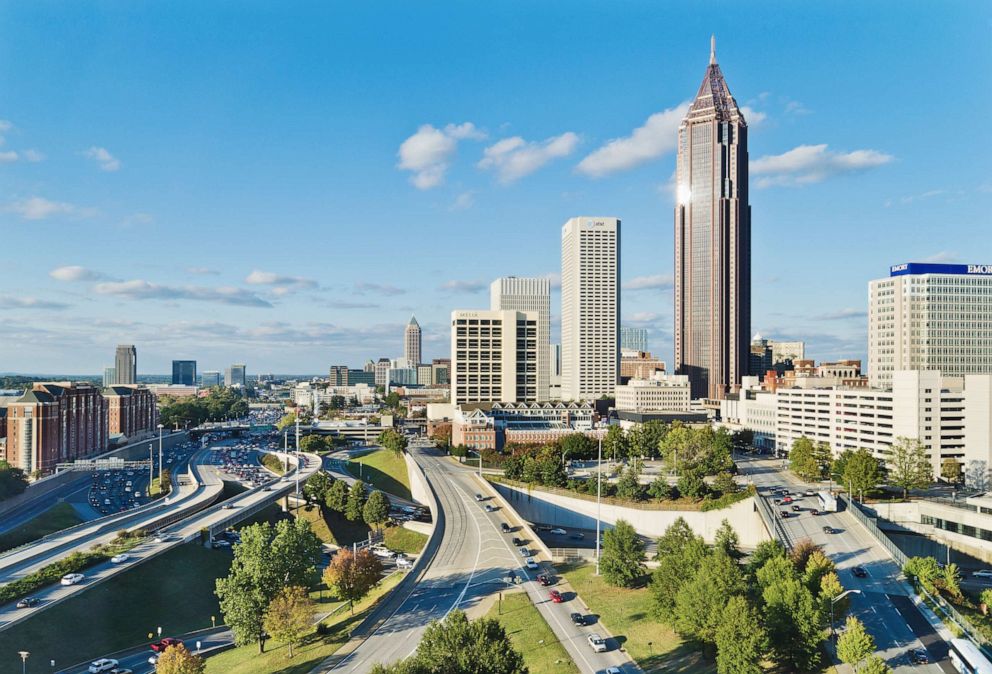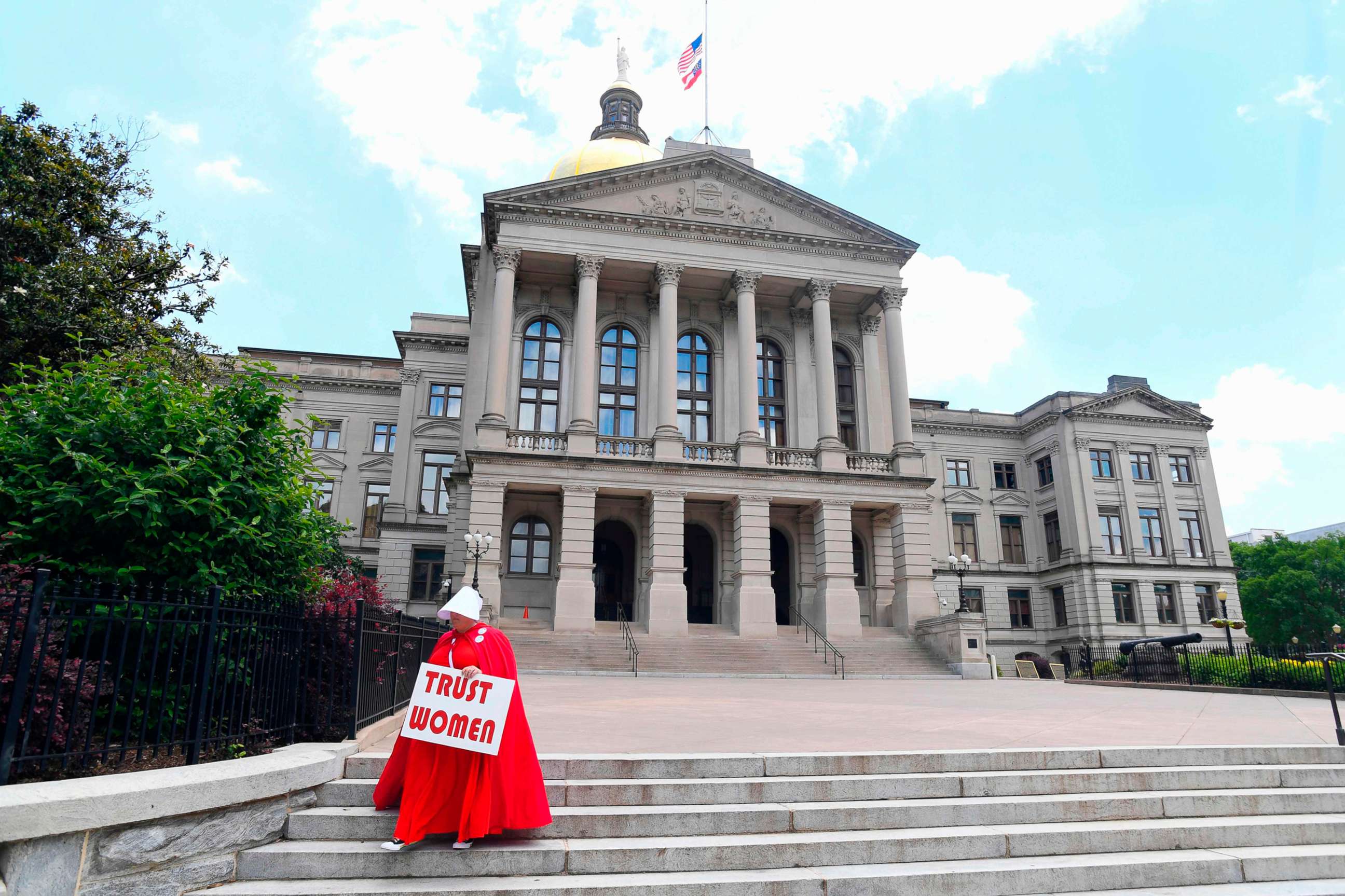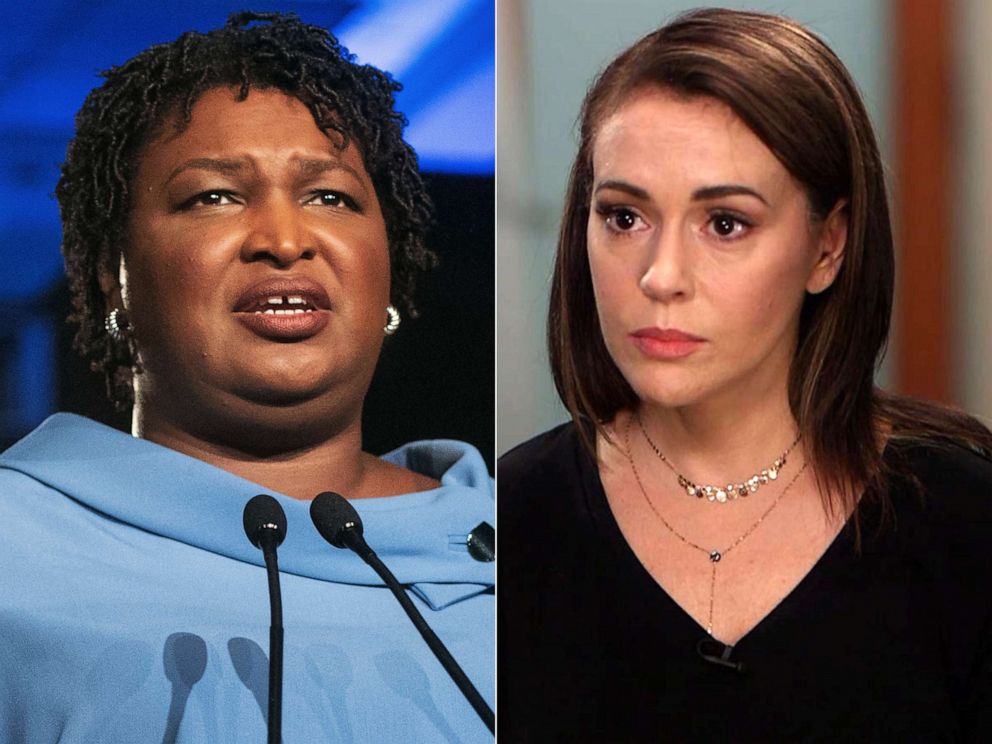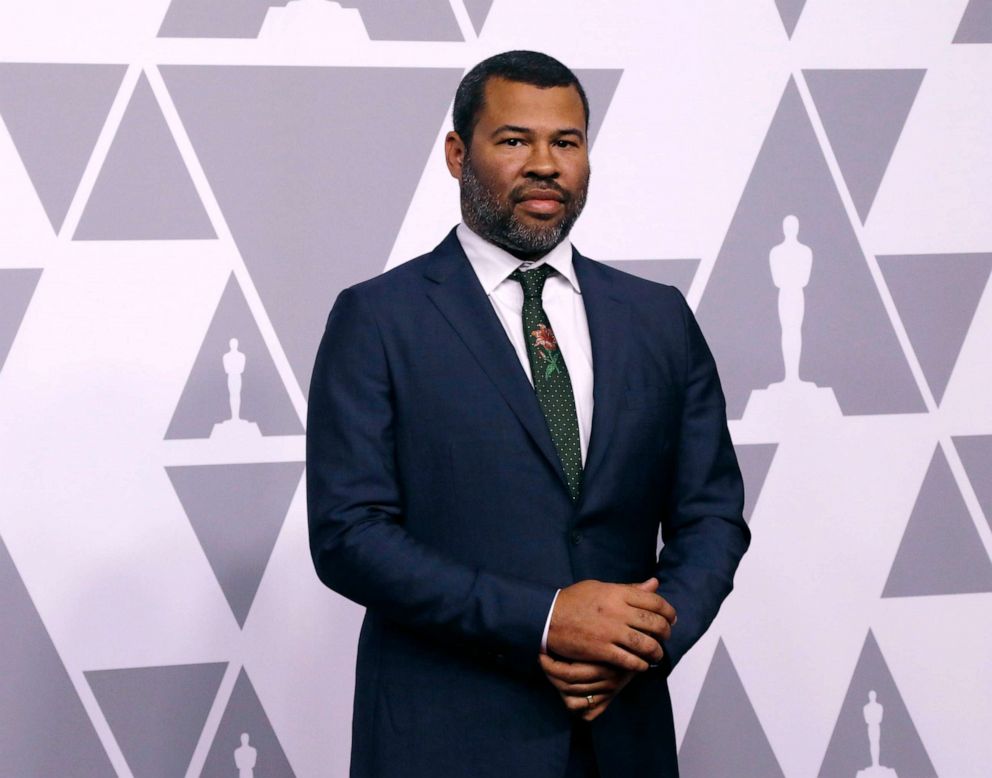Hollywood's influence comes into focus in Georgia as celebrities slam Republicans over abortion laws
The "Hollywood of the South" is home to a multi-billion dollar film industry.
Amid a wave of new anti-abortion laws passed in several states this week, celebrities — from A-list musicians like Lady Gaga and Rihanna to Hollywood heavyweights like Kerry Washington, Reese Witherspoon and Jordan Peele — are using their platforms to express their outrage.
But as "heartbeat" abortion bans face legal challenges across the country, Hollywood's influence is coming into particular focus in Georgia, where enticing tax incentives have helped transform the state into a production and filming oasis.
The Georgia Entertainment Industry Investment Act, which was signed into law in 2008, provides a 20% tax credit for companies that spend $500,000 or more in the state and grants an additional 10% tax credit if the project includes a promotional logo provided by the Peach State.
Why Hollywood has sway in Georgia
Earlier this month, Georgia became the fourth state this year alone to pass a "heartbeat" abortion ban when the state's Republican Gov. Brian Kemp signed a law that bans abortions after six weeks of pregnancy. Kentucky, Mississippi and Ohio also passed laws this year that ban abortion after a fetal heartbeat can be detected, which can happen about a month and a half after a woman becomes pregnant.

Before signing the law, Georgia Gov. Brian Kemp acknowledged that the state would likely face legal challenges.
"I realize that some may challenge it in a court of law but our job is to do what is right not what is easy," Kemp said.
Georgia is home to a multi-billion dollar film industry and, according to a study by the non-profit FilmL.A., more best performing films were made in Georgia in 2016 than any other state or country. Twelve of the 100 best performing films were made in California that year, while 17 were made in Georgia, which ranked in first place.
According to Project Casting, dozens of films and TV shows are filming in Georgia in May alone, including one of the most popular -- the Netflix hit "Stranger Things."
Then-Gov. Nathan Deal announced in April 2018 that the state's film and TV industry generated a total economic impact of $9.5 billion during the 2018 fiscal year, with 455 productions shot in the state representing $2.7 billion in direct spending.

But the abortion debate has forced companies to question whether they should continue doing business in the state. While several production studios indicated they would not film in Georgia in light of the anti-abortion bill, the biggest production companies have remained silent so far, as they track how the law will play out in court.
“Film and television production in Georgia supports more than 92,000 jobs and brings significant economic benefits to communities and families. It is important to remember that similar legislation has been attempted in other states, and has either been enjoined by the courts or is currently being challenged," a spokesman for the Motion Picture Association of America (MPAA) told ABC News. "The outcome in Georgia will also be determined through the legal process. We will continue to monitor developments.”
The MPAA is a trade association founded in 1922 and now represents the five major film studios in Hollywood — Walt Disney Studios, Paramount Pictures, Sony Pictures, Universal Pictures, Warner Bros., and Netflix — a leader in the streaming service industry. ABC News is owned by Disney.
To boycott or not to boycott
Actress Alyssa Milano — an outspoken political activist who has also been vocal in the #MeToo and #TimesUp movements — was one of the first to call for a boycott of Georgia, telling The Wrap, "I will do everything in my power to get as many productions as possible — including ‘Insatiable’ — to move out of this state which continues to put forth oppressive, hurtful policy that contradicts everything the entertainment industry stands for."

Several smaller production companies, including “The Wire” creator David Simon's Blown Deadline Productions, Mark Duplass and his Duplass Brothers Productions, Killer Films and CounterNarrative Films slammed the law and vowed to boycott the state.
"I can’t ask any female member of any film production with which I am involved to so marginalize themselves or compromise their inalienable authority over their own bodies. I must undertake production where the rights of all citizens remain intact. Other filmmakers will see this," Simon tweeted.
"Killer Films will no longer consider Georgia as a viable shooting location until this ridiculous law is overturned," CEO Christine Vachon tweeted.
"Don’t give your business to Georgia. Will you pledge with me not to film anything in Georgia until they reverse this backwards legislation?" Duplass wrote.
"No Georgia filming on any of our projects until the unconstitutional & anti-woman law is gone," Neal Dodson, who runs CounterNarrative Films with J. C. Chandor, tweeted.
And actor Jason Bateman, who is starring in Netflix' “Ozark” and HBO's “The Outsider," which are currently filming in Georgia, told The Hollywood Reporter on Thursday that he will boycott Georgia if the “heartbeat bill” goes into effect.
“If the ‘heartbeat bill’ makes it through the court system, I will not work in Georgia, or any other state, that is so disgracefully at odds with women’s rights,” he said.
ABC News has reached out to the governor's office, but a request for comment on the proposed boycotts was not immediately returned.
However, some of the biggest critics of the anti-abortion legislation fear that the boycott could backfire.
A group of women from the Georgia film and media industry, who oppose the anti-abortion legislation, urged Hollywood not to boycott the state in a Change.org petition that has garnered nearly 2000 signatures.
"It would be a great comfort to move to another place where the fights felt fair and the battles were easier to win. But that would be giving up and we are not quitters. To those who choose not to come to Georgia because of the actions of our government, we understand your reasoning," the petition says. "But please know this: Georgia’s hardworking women and many men in this industry will continue to be the resistance from the inside.
"With our voices, our art, and our daily boots on the ground, we’ll keep working for the leadership we deserve," the petition continued. "Your condemnation is understandable, but what we really need most is allies. Change is coming. Your support and encouragement is appreciated, however you can give it."
Former Georgia gubernatorial candidate Stacey Abrams -- who has also been rumored to be considering a run for the presidency -- echoed the sentiment and urged producers not to boycott Georgia. Instead, she urged supporters to help local organizations that are fighting the legislation.
“While I support those who want to live their values by not bringing their resources here, I do not want to harm the citizens of Georgia who are doing this work,” Abrams told MSNBC on Thursday.
"I appreciate the energy & passion of those who have called for a boycott - publicly or quietly. While we differ on strategy, we are in solidarity," Abrams also tweeted. "Your determination to bring attention to their hateful works & right this wrong should be lauded. Looking at you @Alyssa_Milano."
In response to an Abrams tweet, Milano pledged to donate $10,000 to "the grassroots orgs on the ground fighting against hurtful policies in Georgia" and challenged corporations that she has partnered up with in Georgia to match her donation.
Directors J.J. Abrams of Bad Robot Productions and Jordan Peele of Monkeypaw Productions announced in a joint statement that they will continue filming HBO’s “Lovecraft Country” in Georgia, but pledged to donate their salaries to the American Civil Liberties Union and Fair Fight Georgia.

“Governor Kemp’s ‘Fetal Heartbeat’ Abortion Law is an unconstitutional effort to further restrict women and their health providers from making private medical decisions on their terms," they said. "Make no mistake, this is an attack aimed squarely and purposely at women. We stand with Stacey Abrams and the hardworking people of Georgia, and will donate 100% of our respective episodic fees for this season to two organizations leading the charge against this draconian law: the ACLU of Georgia and Fair Fight Georgia. We encourage those who are able to funnel any and all resources to these organizations.”
And Georgia state representative Dar'shun Kendrick, a Democrat who is critical of the law, urged Hollywood not to boycott the state.
"I have constituents who benefit from the film and industry in GA. So instead of boycotting, I am advocating for taking BACK the House and Senate to majority democrats," Kendrick tweeted.
Several celebrities, including Kerry Washington, have pledged to donate to grassroots organizations to fight the law, but as this plays out in court, it has yet to be seen how the biggest players will respond.
Missouri became the latest state on Friday to push controversial anti-abortion laws forward when the Republican-led House passed a series of sweeping abortion restrictions, including an 8-week ban. The legislation, which includes an exception for medical emergencies, but not for cases of rape or incest, is set to be signed by the state's Republican Gov. Mike Parson.
"I’m beyond upset about the passing of new abortion bans in Alabama, Kentucky, Mississippi, Georgia, and Ohio. This is Unconstitutional and Abhorrent. We can not tolerate this attack on women’s fundamental rights," Witherspoon tweeted.
And on Wednesday, Alabama Gov. Kay Ivey signed a controversial abortion ban into law that makes it a felony for doctors in the state to perform abortions in all cases, with the only exception being when the life of the mother is threatened. It does not include exceptions for cases of rape or incest.
Ivey also acknowledged that the law will face legal challenges in a statement on Wednesday.
"No matter one’s personal view on abortion, we can all recognize that, at least for the short term, this bill may similarly be unenforceable. As citizens of this great country, we must always respect the authority of the U.S. Supreme Court even when we disagree with their decisions. Many Americans, myself included, disagreed when Roe v. Wade was handed down in 1973," she wrote. "The sponsors of this bill believe that it is time, once again, for the U.S. Supreme Court to revisit this important matter, and they believe this act may bring about the best opportunity for this to occur."
Oscar-nominated director DuVernay cautioned that what happened in Alabama could impact the nation.
"Don’t shake your head at Alabama and then keep going about your day. Realize that this is a warning. It’s Alabama and abortion today. It’s you and your rights tomorrow. Your silence will not save you. So speak up," she tweeted.
And several celebrities, including Rihanna and Lady Gaga, slammed the male lawmakers who voted for the laws.
"Take a look. these are the idiots making decisions for WOMEN in America. Governor Kay Ivey...SHAME ON YOU!!!!" Rihanna wrote, along with a photo of all 25 white, male Alabama state senators who voted for the bill.
ABC News' Lesley Messer and Meghan Keneally contributed to this report.




